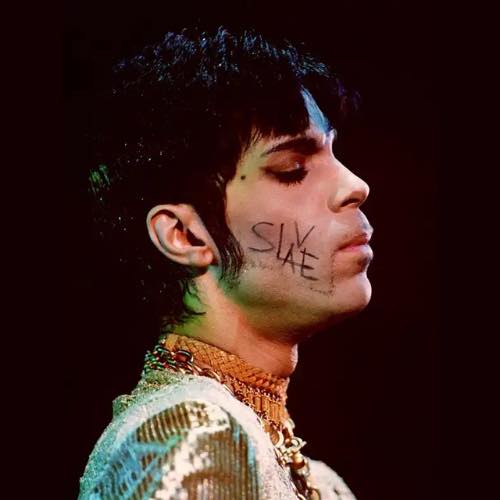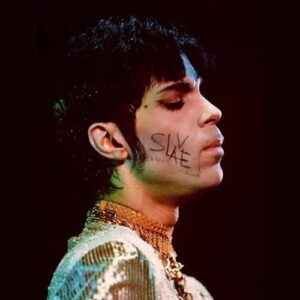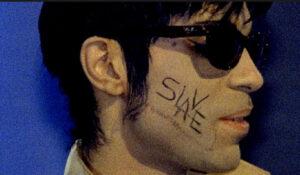
 The legacy Prince left behind goes way beyond his musical talents. The belated, beloved artist was also a freedom fighter whose artistic legacy included protest, demand, advocacy and revolution. At the height of his career, he took the unusual step of writing the word “Slave” on his face as a form of protest to the control that Warner Bros exercised over his music. This move was one of the boldest the world had ever seen by any artist against the music industry. Prince was the foremost high-profile musician to first speak out against the disproportionate control that record labels exert over recording artists.
The legacy Prince left behind goes way beyond his musical talents. The belated, beloved artist was also a freedom fighter whose artistic legacy included protest, demand, advocacy and revolution. At the height of his career, he took the unusual step of writing the word “Slave” on his face as a form of protest to the control that Warner Bros exercised over his music. This move was one of the boldest the world had ever seen by any artist against the music industry. Prince was the foremost high-profile musician to first speak out against the disproportionate control that record labels exert over recording artists.
Because he felt that his contract with Warner Brothers stifled his artistic vision and limited his creativity, Prince waged a fierce battle for his creative and financial freedom. He started giving concerts, appearing in public and attending business meetings with the word “Slave” emblazoned on his jaw. This was Prince’s way of taking a radical stand against the suppression of his artistic freedom. One can only imagine the chill in the room when the electrifying superstar walked into the record company’s board meetings with the word “Slave” etched on his face.
“Prince had unwavering courage and determination, and he was relentless in his pursuit of artistic freedom just as he was with his artistic creations. He had so much tenacity that if he had been a slave, they would have had to cut off his feet to keep him from trying to escape! Prince had grit, fire in his belly, and an indelible spirit which is why he still shines brightly today” – KJP
Prince had signed to Warner Brothers records in 1977 where the biggest albums of his career were released. The relationship with Warner Brothers had almost completely soured by the time his hit album “Diamonds and Pearls” was released in 1991. Prince wanted to release more music, more often, he wanted to do concerts when he wanted, and he felt he should own the original master tapes for his own hit albums. When Warners disagreed, Prince responded by labeling himself a “slave” and did not hesitate to let his fans and the public see how he had branded himself. Prince rebelled because he felt that record contracts are just like slavery.
“People think I’m a crazy fool for writing ‘slave’ on my face,” Prince told Rolling Stone magazine back in 1996. “But if I can’t do what I want to do, what am I? When you stop a man from dreaming, he becomes a slave. “That’s where I was. I don’t own Prince’s music. If you don’t own your masters, your master owns you.” “Despite everything, no one can dictate who you are to other people,” he told Rolling Stone in 2011.
The split from his music label was so acrimonious that in 1993, Prince also changed his name to an unpronounceable symbol – and became “The Artist Formerly Known As Prince.” Known as a Love Symbol that he adopted for his stage name on his 35th birthday, it was a combination of male and female gender signs which reflected a fluid approach to his creativity.
 In an interview regarding the Love Symbol, he told Larry King, “I had to search deep within my heart and spirit, and I wanted to make a change and move to a new plateau in my life,” he said. “And one of the ways in which I did that was to change my name. It sort of divorced me from the past and all the hangups that go along with it.”
In an interview regarding the Love Symbol, he told Larry King, “I had to search deep within my heart and spirit, and I wanted to make a change and move to a new plateau in my life,” he said. “And one of the ways in which I did that was to change my name. It sort of divorced me from the past and all the hangups that go along with it.”
After nearly two decades of public and private battles with his record company, Prince found freedom when his contract with Warner Brothers finally ended. He then released the historic three-disc album “Emancipation” in 1996, distributed and marketed with EMI where he was allowed to retain his masters. With a theme of freedom embedded in the lyrics, the “Emancipation” album was unlike anything Prince had ever created. It explored topics like marriage, fatherhood and less sexy subjects than some of his previous erotic themes. “Emancipation” was Prince’s 19th album where he finally got the artistic freedom he always wanted.
“This is what freedom sounds like,” Prince said about the album to USA Today in 1996. “When I saw light at the end of the tunnel, I made a beeline for it. This is the most exciting time of my life. There was nothing in the way when I recorded. Nobody looked over my shoulder. Nothing was remixed, censored, chopped down or edited.”
Prince went on to later negotiate an amicable major deal with Warner Bros Records nearly 20 years after the famous split, where he regained ownership of some master recordings and was able to produce more hit albums on his own terms. His newly found artistic freedom was a result of his activism and his courage to stand up to the big music industry. He set the precedent for artists today who have demanded charge over their own music. The multi-talented musician was a pioneer in the music industry when he reclaimed the rights to his intellectual property, setting a new norm in the music world. Many noted artists today who are able to record and release their own music without the help of a large music label have Prince to thank.
His efforts in the music industry represent a win for society’s ongoing battle for freedom, marked especially during Juneteenth emancipation celebrations. As national issues of inequality are likewise continuously being confronted around the world, Prince deserves to be recognized in history as a freedom fighter because he was never shy about standing up for himself and others. The music, passion and quest for freedom of the celebrated belated icon has continued to inspire and liberate people around the world, and likely will for generations to come.
 The legacy Prince left behind goes way beyond his musical talents. The belated, beloved artist was also a freedom fighter whose artistic legacy included protest, demand, advocacy and revolution. At the height of his career, he took the unusual step of writing the word “Slave” on his face as a form of protest to the control that Warner Bros exercised over his music. This move was one of the boldest the world had ever seen by any artist against the music industry. Prince was the foremost high-profile musician to first speak out against the disproportionate control that record labels exert over recording artists.
The legacy Prince left behind goes way beyond his musical talents. The belated, beloved artist was also a freedom fighter whose artistic legacy included protest, demand, advocacy and revolution. At the height of his career, he took the unusual step of writing the word “Slave” on his face as a form of protest to the control that Warner Bros exercised over his music. This move was one of the boldest the world had ever seen by any artist against the music industry. Prince was the foremost high-profile musician to first speak out against the disproportionate control that record labels exert over recording artists.
Because he felt that his contract with Warner Brothers stifled his artistic vision and limited his creativity, Prince waged a fierce battle for his creative and financial freedom. He started giving concerts, appearing in public and attending business meetings with the word “Slave” emblazoned on his jaw. This was Prince’s way of taking a radical stand against the suppression of his artistic freedom. One can only imagine the chill in the room when the electrifying superstar walked into the record company’s board meetings with the word “Slave” etched on his face.
“Prince had unwavering courage and determination, and he was relentless in his pursuit of artistic freedom just as he was with his artistic creations. He had so much tenacity that if he had been a slave, they would have had to cut off his feet to keep him from trying to escape! Prince had grit, fire in his belly, and an indelible spirit which is why he still shines brightly today” – KJP
Prince had signed to Warner Brothers records in 1977 where the biggest albums of his career were released. The relationship with Warner Brothers had almost completely soured by the time his hit album “Diamonds and Pearls” was released in 1991. Prince wanted to release more music, more often, he wanted to do concerts when he wanted, and he felt he should own the original master tapes for his own hit albums. When Warners disagreed, Prince responded by labeling himself a “slave” and did not hesitate to let his fans and the public see how he had branded himself. Prince rebelled because he felt that record contracts are just like slavery.
“People think I’m a crazy fool for writing ‘slave’ on my face,” Prince told Rolling Stone magazine back in 1996. “But if I can’t do what I want to do, what am I? When you stop a man from dreaming, he becomes a slave. “That’s where I was. I don’t own Prince’s music. If you don’t own your masters, your master owns you.” “Despite everything, no one can dictate who you are to other people,” he told Rolling Stone in 2011.
The split from his music label was so acrimonious that in 1993, Prince also changed his name to an unpronounceable symbol – and became “The Artist Formerly Known As Prince.” Known as a Love Symbol that he adopted for his stage name on his 35th birthday, it was a combination of male and female gender signs which reflected a fluid approach to his creativity.
 In an interview regarding the Love Symbol, he told Larry King, “I had to search deep within my heart and spirit, and I wanted to make a change and move to a new plateau in my life,” he said. “And one of the ways in which I did that was to change my name. It sort of divorced me from the past and all the hangups that go along with it.”
In an interview regarding the Love Symbol, he told Larry King, “I had to search deep within my heart and spirit, and I wanted to make a change and move to a new plateau in my life,” he said. “And one of the ways in which I did that was to change my name. It sort of divorced me from the past and all the hangups that go along with it.”
After nearly two decades of public and private battles with his record company, Prince found freedom when his contract with Warner Brothers finally ended. He then released the historic three-disc album “Emancipation” in 1996, distributed and marketed with EMI where he was allowed to retain his masters. With a theme of freedom embedded in the lyrics, the “Emancipation” album was unlike anything Prince had ever created. It explored topics like marriage, fatherhood and less sexy subjects than some of his previous erotic themes. “Emancipation” was Prince’s 19th album where he finally got the artistic freedom he always wanted.
“This is what freedom sounds like,” Prince said about the album to USA Today in 1996. “When I saw light at the end of the tunnel, I made a beeline for it. This is the most exciting time of my life. There was nothing in the way when I recorded. Nobody looked over my shoulder. Nothing was remixed, censored, chopped down or edited.”
Prince went on to later negotiate an amicable major deal with Warner Bros Records nearly 20 years after the famous split, where he regained ownership of some master recordings and was able to produce more hit albums on his own terms. His newly found artistic freedom was a result of his activism and his courage to stand up to the big music industry. He set the precedent for artists today who have demanded charge over their own music. The multi-talented musician was a pioneer in the music industry when he reclaimed the rights to his intellectual property, setting a new norm in the music world. Many noted artists today who are able to record and release their own music without the help of a large music label have Prince to thank.
His efforts in the music industry represent a win for society’s ongoing battle for freedom, marked especially during Juneteenth emancipation celebrations. As national issues of inequality are likewise continuously being confronted around the world, Prince deserves to be recognized in history as a freedom fighter because he was never shy about standing up for himself and others. The music, passion and quest for freedom of the celebrated belated icon has continued to inspire and liberate people around the world, and likely will for generations to come.
